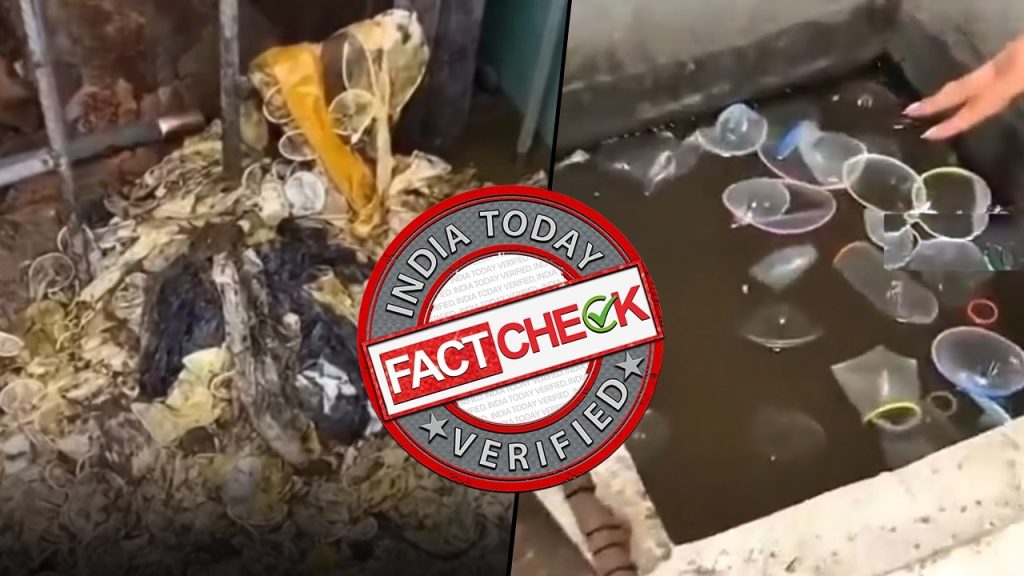Listen to the article
Fact Check: Viral Videos of Condom-Clogged Drains Not from Delhi Women’s Hostel
Two videos circulating widely on social media allegedly showing drainage systems at a Delhi women’s hostel clogged with used condoms have been debunked as misleading by India Today’s Fact Check team.
The first viral video features news reporters focusing their cameras on used condoms floating in a drain. A reporter can be heard saying, “As you can see, this is the sewage chamber of the hostel. Yesterday, when the cleaning staff opened the cover of this sewage drain, a huge number of used condoms were revealed. These were found near the girls’ hostel.”
The second video similarly shows numerous used condoms inside and scattered around a drainage area. This footage has been widely shared across Facebook with sensationalist captions referring to a “Condom Nala Scandal” at a Delhi PG hostel, with posts claiming the discovery has raised “serious hygiene and safety concerns” among local residents.
Several established news outlets including NDTV Marathi, Orissa Post, and Sakal featured the second video in their reporting, attributing the incident to Delhi without proper verification.
However, an investigation by India Today’s Fact Check team has revealed that neither video is what it purports to be. The first video was determined to be AI-generated, while the second originates from Nigeria, not India’s capital.
The investigation found that the first video contained a “VN Creator” logo, which appears to have been strategically placed to conceal the watermark from Sora, OpenAI’s video generation tool. The same Facebook page had previously shared similar content allegedly showing used condoms found in Pune hostels, where the Sora watermark was clearly visible—confirming the artificial nature of the content.
For the second video, a reverse image search of key frames led investigators to earlier posts identifying Nigeria as the source. A Nigerian social media influencer had posted a longer version of the same footage on Instagram on October 13, explicitly mentioning its Nigerian origin. In the extended clip, a voiceover can be heard mentioning “Nigeria.” Nigerian news outlet Edo Online Television had also shared this video on the same date with the hashtag “#Nigeria.”
This case highlights the increasing challenge of misinformation in the digital age, where content from different geographic regions or even AI-generated material can be repurposed to create false narratives that may damage reputations or cause unnecessary public concern. It also demonstrates the importance of verification before sharing or reporting on viral content.
The incident adds to growing concerns about the use of AI-generated content in creating misinformation, particularly when paired with genuine but misattributed footage from elsewhere in the world. As detection tools improve, fact-checking organizations continue to play a crucial role in separating fact from fiction in viral social media content.
For media outlets and consumers alike, this serves as a reminder of the need for rigorous fact-checking before sharing sensational content, especially when it makes extraordinary claims that could impact reputations or public perception.
Fact Checker
Verify the accuracy of this article using The Disinformation Commission analysis and real-time sources.




8 Comments
It’s concerning how easily misinformation can gain traction, even from reputable news sources. Fact-checking is crucial to maintain public trust and prevent the spread of falsehoods.
While the original videos seemed scandalous, I’m glad the investigation proved the claims were unfounded. Responsible reporting and a commitment to the facts are so important these days.
This serves as a good reminder to be cautious about sensational claims, especially those that target vulnerable communities. Verifying information before sharing is the responsible thing to do.
This situation highlights the importance of verifying claims, especially those that could unfairly stigmatize a community. I’m glad the truth came to light and the false narrative was debunked.
Glad to see the claims about used condoms in the Delhi girls’ hostel drain were proven false. Spreading unverified rumors can do real harm, so it’s good the facts were checked and clarified.
While the viral videos seemed sensational, I’m relieved the investigation found the claims were misleading. Responsible reporting and fact-checking are crucial to avoid perpetuating misinformation.
I appreciate the due diligence in debunking these viral videos. Jumping to conclusions without evidence can lead to harmful stereotyping, so I’m glad the facts were corrected.
Interesting to see how quickly unsubstantiated stories can spread online these days. Kudos to the fact-checkers for taking the time to investigate and set the record straight on this one.